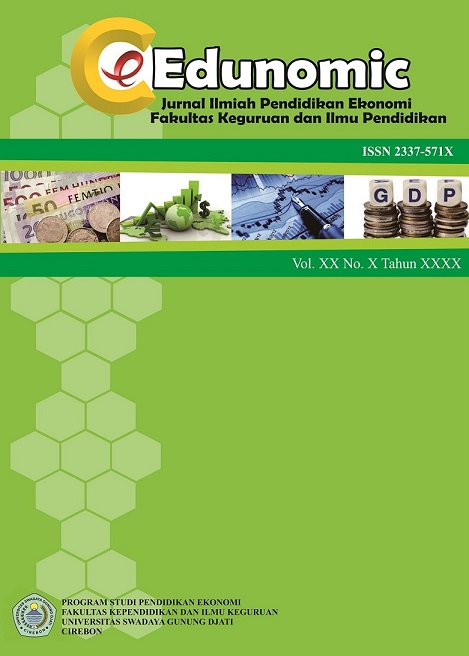PENGARUH SELF REGULATED LEARNING TERHADAP PRODUKTIVITAS PENDIDIKAN PELAJARAN EKONOMI XI-F SMAN 1 KARTASURA DIMODERASI FASILITAS BELAJAR
DOI:
https://doi.org/10.33603/ejpe.v13i2.10764Abstract
This research aims to find out how much influence of self regulated learning of educational productivity in Economics subjects for XI-F students at SMAN 1 Kartasura and find out how much influence of self regulated learning of educational productivity in Economics subjects for XI-F students at SMAN 1 Kartasura when moderated by learning facilities. The population 180 students from XI-F SMAN 1 Kartasura. The sample used was determined using SLOVIN formula, resulting 125 students. This research is a descriptive quantitative. The sampling techinique employed was proportionate stratified random sampling, with data obtained questionnaire. Data collection tool uses a questionnaire. Validity was evaluated using Bivariate Correlation, specifically the Pearson Product Moment Correlation Coeffiecient. Reliability was assessed using Cronbach’s Alpha. Data analysis technique used were classical assumption test and hypothesis test. The classical assumption test included the normality test, linearity test, multicollinearity test, and heterokedasticity test. Hypothesis test was conducted using t test, simple linear regression, and moderated regression analysis. The result of this study indicates that there is influence of self regulated learning of educational productivity in Economics subjects for XI-F students at SMAN 1 Kartasura and there is no influence of self regulated learning of educational productivity in Economics subjects for XI-F SMAN 1 Kartasura when moderated by learning facilities. This shows that the factors from intern and extern have an important role in the success of students in educational productivity.
Keywords: educational productivity, learning facilities, self regulated learning
References
Abdullah, M. (2015). Metodologi penelitian kuantitiatif. Aswaja Pressindo.
Amruddin, Priyanda, R., Agustina, T. S., Ariantini, N. S., Rusmayani, N. G. A. L., Aslindar, D. A., et al. (2022). Metodologi penelitian kuantitiatif. Pradina Pustaka.
Anggryawan, I. H. (2019). Pengaruh fasilitas belajar dan motivasi belajar terhadap hasil belajar siswa pada mata pelajaran Ekonomi. Jurnal Pendidikan Ekonomi (JUPE), 7(3), 71–75. https://doi.org/. https://doi.org/10.26740/jupe.v7n3.p71-75
Bustami, N., Amelia, M., & Selvia, N. (2024). Pengaruh konsep diri, cara belajar, aktivitas belajar, pemanfaatan siswa kelas xi ips pada mata pelajaran ekonomi di man 3 padang. 8, 36440–36446.
Dzakiah, S., & Widyasari, P. (2021). Regulasi diri sebagai mediator interaksi mindfulness dan prokrastinasi akademik. Persona: Jurnal Psikologi Indonesia, 10(1), 48–62. https://doi.org/10.30996/persona.v10i1.4129
Febriani, E. (2023). Pengaruh regulasi diri dan efikasi diri terhadap hasil belajar matematika siswa. Jurnal Matematika Dan Ilmu Pengetahuan Alam, 1(1), 101–110.
Ginting R, G, B & Santi, N. W. A. (2024). Pengaruh fasilitas belajar dan motivasi belajar terhadap hasil belajar siswa pada mata pelajaran ekonomi kelas xi sma negeri 1 sukasada. Ekuitas: Jurnal Pendidikan Ekonomi, 12(2), 234–242. https://ejournal.undiksha.ac.id/index.php/EKU
Hanushek, E. A. (2020). Chapter 13: Education production functions. the economics of education, second edition. Academic press
Juniar, N. (2024). Studi literatur: Pengaruh self regulated learning terhadap prestasi belajar siswa. Jendela: Jurnal Pendidikan Elaborasi Athirah, 1(1), 17–24.
Lesmanawati, Y., Rahayu, W., Kadir, & Iasha, V. (2020). Pengaruh self regulated learning terhadap kemampuan berpikir kreatif matematis siswa sekolah dasar. Jurnal Basicedu, 4(3), 593–603. https://doi.org/https://doi.org/10.31004/basicedu.v4i3.400
Ma, Y., & Guo, W. Y. (2023). Exploring the effect of learning motivation and self-regulated learning climate on undergraduates’ self-regulated learning in higher education. International Journal on Social and Education Sciences, 5(2), 354–366. https://doi.org/10.46328/ijonses.512
Meliyana, A., Arham, A., Panigoro, M., Hafid, R., Hasiru, R., & Sudirman, S. (2023). Pengaruh fasilitas belajar siswa terhadap hasil belajar siswa. Journal of Economic and Business Education, 1(2), 26–33. https://doi.org/10.37479/jebe.v1i2.17904
Nurrahmawati, R., Suherti, H., & Nurdianti, R. R. S. (2024). Pengaruh sikap belajar dan fasilitas pembelajaran terhadap hasil belajar siswa pada mata pelajaran ekonomi. Jurnal Sains Student Research, 2(1), 66–75. https://doi.org/https://doi.org/10.61722/jssr.v2i1.479
Pellokila, I. I., & Taneo, S. T. (2023). Pengaruh regulasi diri kristen terhadap prokrastinasi akademik siswa. Edukatif : Jurnal Ilmu Pendidikan, 5(1), 568–576. https://doi.org/10.31004/edukatif.v5i1.4640
Prasetyo, I. E., Taroreh, J., & Kawulur, A. (2023). Pengaruh fasilitas belajar dan motivasi belajar terhadap hasil belajar siswa kelas xi di sma negeri 1 kawangkoan. Literacy: Jurnal Pendidikan Ekonomi, 4(2), 69–77. https://doi.org/10.53682/jpeunima.v4i2.7582
Rozaini, N., & Panjaitan, P. E. Y. (2020). Pengaruh self regulated learning dan karakter terhadap prestasi belajar mahasiswa pendidikan bisnis universitas negeri medan. Niagawan, 9(1), 14. https://doi.org/10.24114/niaga.v9i1.17651
Rustam, A., & Wahyuni, D. S. (2020). Pengaruh efikasi diri dan regulasi diri terhadap hasil belajar matematika siswa kelas x sma alkhairaat 1 palu. Guru Tua : Jurnal Pendidikan dan Pembelajaran, 3(1), 61-68.
Sapriani, A., & Supriyadi. (2022). Pengaruh fasilitas belajar terhadap prestasi belajar siswa mata pelajaran ips. Arus Jurnal Pendidikan, 2(2), 97–102. https://doi.org/10.57250/ajup.v2i2.75
Sholiha, T. A., Kurniati, N., Tyaningsih, R. Y., & Prayitno, S. (2022). Pengaruh self-regulated learning (srl) terhadap hasil belajar matematika siswa kelas xi sman 1 masbagik. Jurnal Ilmiah Profesi Pendidikan, 7(3), 1355–1362. https://doi.org/10.29303/jipp.v7i3.745
Soesana, A., Subakti, H., Karwanto, Fitri, A., Kuswandi, S., Sastri, L., et al. (2023). Metodologi penelitian kuantitatif. Yayasan Kita Menulis.
Zulfikar, A., & Afian, T. (2021). Pengukuran produktivitas sekolah di SMP kota Mataram. Journal Visionary: Penelitian Dan Pengembangan Di Bidang Administrasi Pendidikan, 9(20), 1–10. https://doi.org/10.33394/vis.v9i2.4818
Downloads
Published
Issue
Section
License
Copyright (c) 2025 Edunomic Jurnal Pendidikan Ekonomi

This work is licensed under a Creative Commons Attribution-ShareAlike 4.0 International License.
Penulis yang menerbitkan karyanya ke jurnal ini setuju dengan persyaratan berikut:
Penulis menyimpan hak cipta dan memberikan jurnal hak penerbitan pertama, dengan karya yang secara serentak dilisensikan di bawah Lisensi: Creative Commons Attribution - Share Alike 4.0 Internasional License yang memungkinkan orang lain membagikan karya dengan pengakuan penerbitan awal dan kepenulisan karya di jurnal ini.










